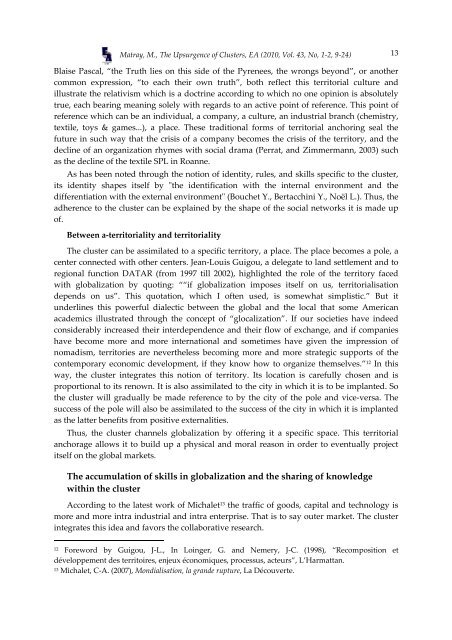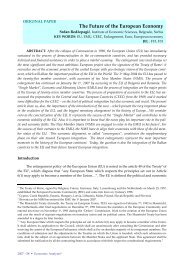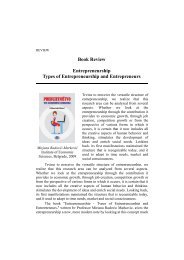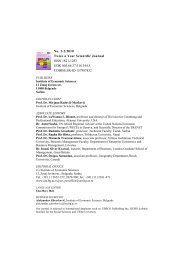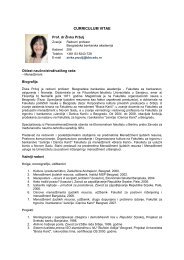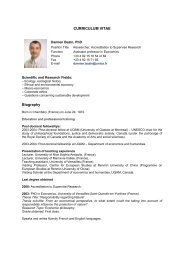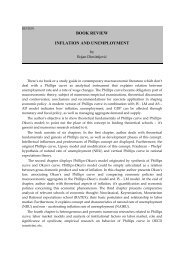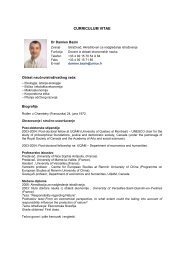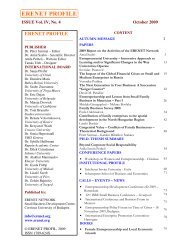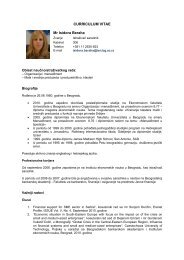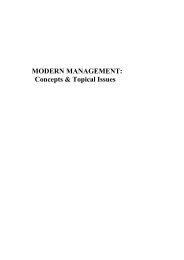Twice a Year Scientific Journal
Twice a Year Scientific Journal
Twice a Year Scientific Journal
Create successful ePaper yourself
Turn your PDF publications into a flip-book with our unique Google optimized e-Paper software.
Matray, M., The Upsurgence of Clusters, EA (2010, Vol. 43, No, 1-2, 9-24) 13<br />
Blaise Pascal, “the Truth lies on this side of the Pyrenees, the wrongs beyond”, or another<br />
common expression, “to each their own truth”, both reflect this territorial culture and<br />
illustrate the relativism which is a doctrine according to which no one opinion is absolutely<br />
true, each bearing meaning solely with regards to an active point of reference. This point of<br />
reference which can be an individual, a company, a culture, an industrial branch (chemistry,<br />
textile, toys & games...), a place. These traditional forms of territorial anchoring seal the<br />
future in such way that the crisis of a company becomes the crisis of the territory, and the<br />
decline of an organization rhymes with social drama (Perrat, and Zimmermann, 2003) such<br />
as the decline of the textile SPL in Roanne.<br />
As has been noted through the notion of identity, rules, and skills specific to the cluster,<br />
its identity shapes itself by ʺthe identification with the internal environment and the<br />
differentiation with the external environmentʺ (Bouchet Y., Bertacchini Y., Noël L.). Thus, the<br />
adherence to the cluster can be explained by the shape of the social networks it is made up<br />
of.<br />
Between a-territoriality and territoriality<br />
The cluster can be assimilated to a specific territory, a place. The place becomes a pole, a<br />
center connected with other centers. Jean-Louis Guigou, a delegate to land settlement and to<br />
regional function DATAR (from 1997 till 2002), highlighted the role of the territory faced<br />
with globalization by quoting: ““if globalization imposes itself on us, territorialisation<br />
depends on us”. This quotation, which I often used, is somewhat simplistic.” But it<br />
underlines this powerful dialectic between the global and the local that some American<br />
academics illustrated through the concept of “glocalization”. If our societies have indeed<br />
considerably increased their interdependence and their flow of exchange, and if companies<br />
have become more and more international and sometimes have given the impression of<br />
nomadism, territories are nevertheless becoming more and more strategic supports of the<br />
contemporary economic development, if they know how to organize themselves.” 12 In this<br />
way, the cluster integrates this notion of territory. Its location is carefully chosen and is<br />
proportional to its renown. It is also assimilated to the city in which it is to be implanted. So<br />
the cluster will gradually be made reference to by the city of the pole and vice-versa. The<br />
success of the pole will also be assimilated to the success of the city in which it is implanted<br />
as the latter benefits from positive externalities.<br />
Thus, the cluster channels globalization by offering it a specific space. This territorial<br />
anchorage allows it to build up a physical and moral reason in order to eventually project<br />
itself on the global markets.<br />
The accumulation of skills in globalization and the sharing of knowledge<br />
within the cluster<br />
According to the latest work of Michalet 13 the traffic of goods, capital and technology is<br />
more and more intra industrial and intra enterprise. That is to say outer market. The cluster<br />
integrates this idea and favors the collaborative research.<br />
12<br />
Foreword by Guigou, J-L., In Loinger, G. and Nemery, J-C. (1998), “Recomposition et<br />
développement des territoires, enjeux économiques, processus, acteurs”, L’Harmattan.<br />
13<br />
Michalet, C-A. (2007), Mondialisation, la grande rupture, La Découverte.


